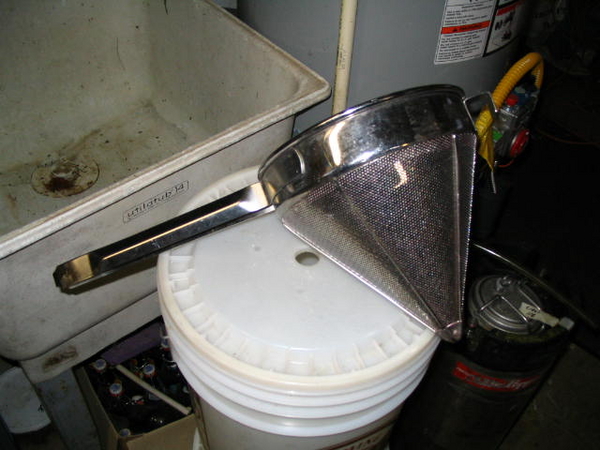Moonpile
Well-Known Member
I'm sure this topic comes up a lot, so I'm sorry if I'm retreading old ground.
So our first brew came ended up with maybe 3.75 gal from a 5 gal recipe. I think a lot of this was lost from wort absorbed into the hops and from straining them out.
In my previous brewing experience (as I've mentioned ~10 years ago), I had started getting fastidious about removing hops and I seem to remember it paying off in clearer beer, but also having the problem of simply loosing volume as a result.
I'm going to solve the volume problem by simply brewing bigger batches, maybe based on 6 gal. My primary is a 6.5 gal carboy, but I think we'll also use plastic too. I'm expecting to yield about 5 gal from a 6 gallon recipe.
Straining the hops out is a pain. I bought a long (maybe 3' by 6") nylon grain bag which I intended to use to help filter. This worked but was slow, pouring into the bag which was on top of the funnel leading into the primary. I have two things I want to try, and I'm looking for comments or advice:
Possible straining method #1: Brew with hops loose in kettle. Sanitize a plastic bucket with spigot. Pour the wort into the long bag allowing more surface area to strain. Wort will drain out the spigot into primary. Basically the bucket will be a giant funnel.
Possible straining method #1: Nylon hop bags during brew. I've used this before and recall it helping with detritus in the wort, but I'm concerned about getting the full benefit of the hops. How big a difference does everyone think it makes having the hops "roaming free" vs "cooped up in a bag"?
Up until now I've only used pellet hops. It seems to me that using whole hops will make any other kind of straining we do a lot easier. Is that going to be true or do they just break up in the boil?
Say I have hops either in a "strainer bag" or in a hop bag that was in the boil. Is it a good idea to squeeze out most of the wort? My gut says "No". Comments?
Moon
So our first brew came ended up with maybe 3.75 gal from a 5 gal recipe. I think a lot of this was lost from wort absorbed into the hops and from straining them out.
In my previous brewing experience (as I've mentioned ~10 years ago), I had started getting fastidious about removing hops and I seem to remember it paying off in clearer beer, but also having the problem of simply loosing volume as a result.
I'm going to solve the volume problem by simply brewing bigger batches, maybe based on 6 gal. My primary is a 6.5 gal carboy, but I think we'll also use plastic too. I'm expecting to yield about 5 gal from a 6 gallon recipe.
Straining the hops out is a pain. I bought a long (maybe 3' by 6") nylon grain bag which I intended to use to help filter. This worked but was slow, pouring into the bag which was on top of the funnel leading into the primary. I have two things I want to try, and I'm looking for comments or advice:
Possible straining method #1: Brew with hops loose in kettle. Sanitize a plastic bucket with spigot. Pour the wort into the long bag allowing more surface area to strain. Wort will drain out the spigot into primary. Basically the bucket will be a giant funnel.
Possible straining method #1: Nylon hop bags during brew. I've used this before and recall it helping with detritus in the wort, but I'm concerned about getting the full benefit of the hops. How big a difference does everyone think it makes having the hops "roaming free" vs "cooped up in a bag"?
Up until now I've only used pellet hops. It seems to me that using whole hops will make any other kind of straining we do a lot easier. Is that going to be true or do they just break up in the boil?
Say I have hops either in a "strainer bag" or in a hop bag that was in the boil. Is it a good idea to squeeze out most of the wort? My gut says "No". Comments?
Moon



























![Craft A Brew - Safale S-04 Dry Yeast - Fermentis - English Ale Dry Yeast - For English and American Ales and Hard Apple Ciders - Ingredients for Home Brewing - Beer Making Supplies - [1 Pack]](https://m.media-amazon.com/images/I/41fVGNh6JfL._SL500_.jpg)






























